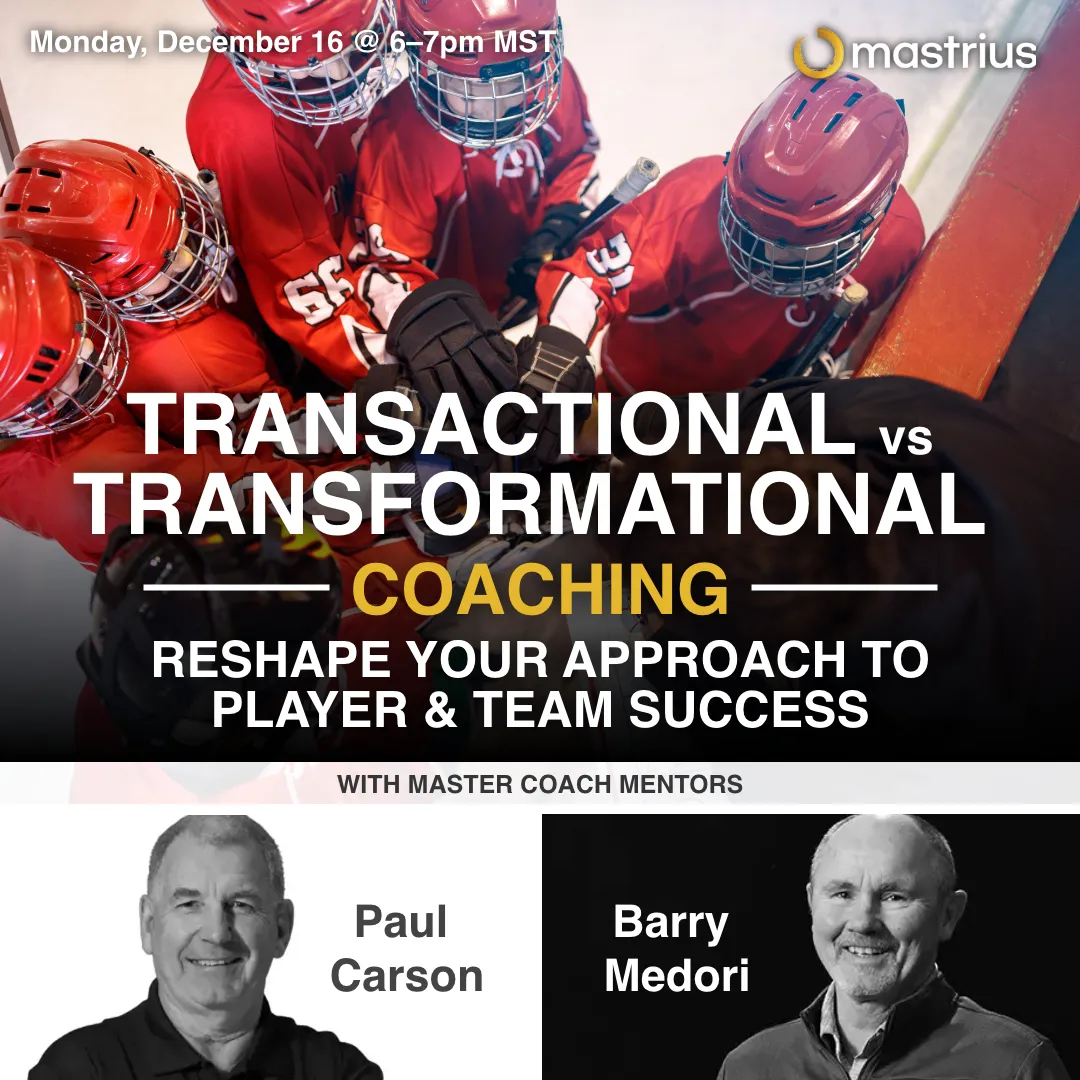
Transactional VS Transformational COACHING: Reshape Your Approach To Player & Team Success
Monday, December 16th
5-6pm PST
6–7pm MST
7-8pm CST
8–9pm EST
Mentors: Paul Carson & Barry Medori
$0.00
Out of stock
📽️ EVENT RECORDING will be made available for all registrants.
Are you ready to elevate YOUR coaching skills and foster a winning team AND culture?
In this interactive and inspiring session, Master Coach Mentors: Barry Medori and Paul Carson will explore how transformational coaching can change the way coaches approach player development, team dynamics, and the overall hockey experience for their players.
Barry and Paul will talk about the key principles of coaching that go beyond the skills of the game by focusing on building character, fostering leadership, athlete well-being, and creating a positive, growth-oriented environment for young players.
Coaches, team leaders and hockey administrators will learn:
You will learn:
- The difference between Transactional and Transformational Coaching
- The role of mindset and motivation in player success.
- How to develop resilience and mental toughness.
- How to balance skill development and performance outcomes with personal growth.
This is a terrific opportunity for coaches and team leaders to better understand lessons that can help players thrive both on and off the ice, fostering the development of skilled players and confident individuals.
We look forward to you joining in on this meaningful conversation about how each of us can contribute to promote a holistic approach to player development and well-being that will benefit your players and team.
Meet Paul Carson
Master Coach and Mentor See Paul’s Mentorship Group Registration Info
- Former VP Hockey Development with Hockey Canada
- Chair of the Board – Coaching Association of Canada
- Co-Chair Coaching and Development – IIHF
- Chair of the Hockey Canada National Coach Committee
- BC Hockey Provincial Coach
- BC Hockey District Coach Coordinator
- Canada Winter Games – Team BC Assistant Coach
- U Sport – UBC Thunderbirds Assistant Coach
- NCCP Master Coach Developer
- NCCP HP1 – Marker and Field Evaluator
- NCCP HP2 – Certified Coach
Annual planning plays a crucial role in providing clear leadership within your team. It offers a structured framework through which you as a leader can communicate your vision and expectations to your staff, players, and the organization. Often times the tools coaches use will go a long way to supporting very good planning process.
My goal as a mentor is to support coaches in their planning process and ensure that everything is connected from the yearly planning process to effective and efficient practice plans to drill progressions that serve the development needs of the players’ process.
Meet Barry Medori
Master Coach and Mentor See Barry’s Mentorship Group Registration Info
Manager Of Coach Mentorship – HOCKEY ALBERTA
- Hockey Canada – Gordon Jukes Award
- Hockey Alberta – Builder, Development & Coaching
awards - Teaching – Award of Excellence
- Spruce Grove – Award of Excellence in Significant
Achievement
My life experiences as an educator, skills instructor, coach and professional mentor are tools that will assist me in working with different levels of coaches as they seek support in developing their skill set and knowledge as a coach.
Mentorship and culture building are two interconnected yet distinct aspects of developing a successful team or organization. Mentorship involves fostering a supportive environment where individuals can grow, learn, and thrive under the guidance of more experienced mentors. This relationship is built on trust, encouragement, and constructive feedback, allowing mentees to develop their skills and confidence. In contrast, culture building focuses on establishing shared values, beliefs, and norms that define the identity of the team or organization. A strong culture promotes unity, collaboration, and a sense of belonging among team members, which can significantly enhance overall performance and satisfaction.
Addressing mental wellness is essential for enhancing overall performance. Athletes often face significant pressure to perform, which can lead to stress, anxiety, and burnout. By prioritizing mental health, coaches and organizations can create an environment where players feel safe to express their concerns and seek support. This can involve incorporating mental wellness practices into training routines, such as mindfulness exercises, relaxation techniques, and open discussions about mental health. By fostering a culture that values mental wellness, teams can enhance resilience, focus, and overall performance, ultimately leading to overall mental wellness for the player.
Effective communication with parents is another critical component of a successful team dynamic. Keeping parents informed about schedules, expectations, and their children’s progress fosters a supportive community around the team. It also helps to manage any concerns or questions that may arise, ensuring that parents feel involved and invested in their children’s athletic journey. Open lines of communication can lead to a more positive experience for both players and their families, ultimately contributing to a healthier team environment.
Bench coaching and skills development are vital for maximizing player performance during competitions. Coaches must be adept at making real-time decisions during games, providing guidance and adjustments to players on the bench. This requires a deep understanding of each player’s abilities and the ability to motivate and inspire them in high-pressure situations. Additionally, ongoing skills development is crucial for players to refine their techniques and improve their overall game. This can include targeted training sessions, one-on-one coaching, and opportunities for players to practice specific skills in a supportive environment.
When preparing for short-term competitions or playoffs, strategic planning becomes essential. This involves not only setting clear goals for the season but also creating detailed practice schedules that maximize the team’s potential. Coaches must consider various factors, such as the strengths and weaknesses of their players, the strategies of opposing teams, and the physical and mental demands of the competition. By developing a comprehensive plan that includes regular practice sessions, skill development drills, and game simulations, teams can ensure they are well-prepared to face challenges head-on.

